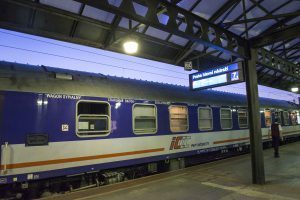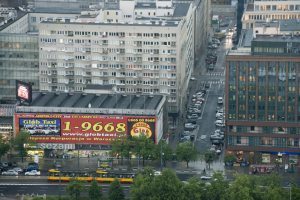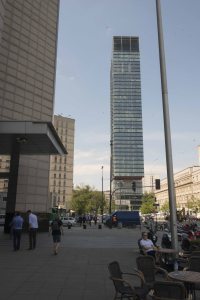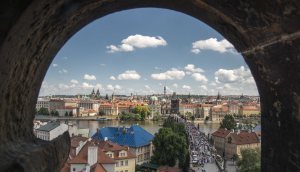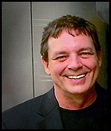Bill Murray's Blog, page 127
June 8, 2014
St. Vitus Cathedral, Prague, Czech Republic – HDR.
June 6, 2014
On Veterans, and Extraordinary Lives
“I don’t like Polish people,” he says, and raises one eyebrow that suggests “And how could anybody, really?”
Among other things, he explains, their language is incomprehensible.
At 84 he has earned his opinions.
He’s graying and a little severe, and turned out today in a light spring jacket, tan sweater and shirt with matching scarf. He takes small steps, pitched forward just a little. He’s tall, thin and upright, and he walks us up and down the streets of Wittenberg all day long.
•••••
His father was born in Poland, but mind you, Poland’s borders wave like a battle flag. When his father was born Posen was German. Today it is Poznan, in Poland.
His father fought the Great War riding great horses for the Kaiser, a dragooneer fighting hand to hand with lances. Imagine. His father owed oaths to three sovereigns in his lifetime: Kaiser Wilhelm, the Weimar government and the Third Reich. Imagine that, too.
•••••
Erich was born in 1930.
His mother had little reason to think he’d go to war. At the Anschluss, the annexation of Austria in 1938, and during the occupation of the Sudetenland later that year the prospects of her eight year old marching off to war seemed distant. When Germany invaded Poland to start the war in earnest, she thanked heaven her boy wasn’t even ten.
But in time her boy was fifteen and the Reich was depleted of fighting stock. He got six weeks training – rifles, hand grenades, knives, and marched off to dig anti-tank trenches near Bratislava. In the end his unit marched two days trying to surrender to the Americans.
Early in the morning of 2 May, the Russians captured the Reich Chancellery. Fighting continued here and there, but a week later the Red Army had collected German remnants, sorry unfledged youth and press-ganged elders in a stadium in Prague. They ran them through a gauntlet of sticks and pipes. They held them for a week, rain or shine, no shelter, no change of clothes, gave them only bread, then marched the lot to Dresden.
He feels the Russians were fair enough, but along the way ordinary Czech people beat them with sticks and bats the Russians did nothing to stop them. The soldier’s tongues were so dry they filled their mouths. They came to a camp in Dresden, a German POW camp for Russians that once held 3000, but the Russians used it for 18,000 Germans.
He was there a month. Sleeping, when one man turned over, the next three or four had to, too.
When he was freed he returned to Berlin, a boy of sixteen and a war veteran. He had no idea if his parents were alive. His father had been a fireman. Because of the bombing, during the war he worked day and night. It was a dangerous job.
Tremulously, Erich walked up to his old house, knocked, and his mother answered. She peered into his eyes and dismissed him: “I already gave food to soldiers” before at last she recognised him.
He mimicks her, putting his palms to his cheeks and exclaiming, “My boy!”
He was so gaunt she didn’t recognize her own son.
His family was reunited but their city lay in ruins. He and his father bicycled 100 kilometers, deep into the Spreewald to trade with farmers, for there was no food in Berlin. 100 kilometers on a bike, for food.
One time it was a Sunday. He was due in school the next day, learning Latin and mathematics but when they got home he leaned his bicycle against the wall and slept all the way through until noon on Tuesday.
They would trade nails, tools, and especially soap for food. His father could get soap. Firemen had a police connection; they were the Fire Police. Maybe that had something to do with it, but he was never clear, he was just sixteen.
What food could you get from farmers after the war? It depended on how many nails you brought, how much soap, but the staple was corn.
•••••
Erich loved a woman, and when they wed in 1951 they had nothing. Basic weddings are free in Germany because of the church tax, but the pastor will suggest every extra you might imagine, a tree and flowers and cards and silly things, but they had nothing and told the man they wanted it simple.
Together they finished school as lawyers. Inge became a family court judge. Erich became a criminal attorney. Once the wall went up they stayed in West Berlin, for nearly three decades, denied the opportunity to get very far out into the countryside around town. Later they showed us the Gleineke bridge, the famous spy bridge where Gary Francis Powers and others were swapped between the East and West Blocs, and they showed us enticing woodlands on the other side that you could see but not visit.
They had a wooden boat for fifty years. They would pack enough food for the weekend and live on the boat from Friday night until Monday morning to get out of town. It gave them a measure of freedom. Except they had to be careful. There were buoys beyond which if they drifted in error, they were liable to be shot. Others were.
•••••
Inge and her mother lived in Berlin right through the allies’ assault, until the block of flats where they lived was bombed and burned. They found shelter in the neighborhood, sharing bedrooms with others and moved around from time to time before the German surrender, when they hid from the Russians.
They so wanted the Americans to arrive first because of the stories they’d heard of Russian soldiers and rape. There was a public shelter across the street from the last place they lived, nearby enough that Inge, a teenager in 1945, and her mother watched in terror as Russian soldiers went in and women came out, ‘blouses ripped’ and hysterical. Even parts of the rump German leadership fled west to surrender to the advancing Americans rather than the Russians.
Finally one day a single Russian soldier, very young, she said, pounded on their door and opened it to find her and her mother inside. “This is it,” her mother said, the moment of horror they’d built up in their minds in all those nights underground, burrowing like rodents against the bombs and the fires.
But the soldier just looked, then closed the door.
Later a Russian soldier stole her bicycle but left them alone.
•••••
She thought that because of some translation problem, when the Russians asked the Germans what kind of seed they wanted to plant they misunderstood that the Germans wanted corn instead of wheat, so now there are corn fields where there weren’t before. Which her future husband bicycled into the Spreewald to get instead of starving.
People ate most of the kernels the Russians brought instead of planting them. Which is part of the reason she loved the Americans. They brought actual bread instead of seeds. She said she would never forget when she and her mother got a whole loaf of bread from the Americans.
When President Kennedy came to give his ‘Ich bin ein Berliner’ speech, of course she went, but to Inge, more than Kennedy the star of the show was General Lucien Clay, the head of the American occupation sector, who came out of retirement to accompany Kennedy. She said Berliners felt it was he who had fed and saved them.
•••••
They traveled widely once they could, after the wall came down. They visited all the European capitals. They survived a vicious hurricane in St. Maarten. They liked the warmth of the Mediterranean and the Persian Gulf in winter and spent lots of beach time in Cyprus and Doha and Dubai. We met some twenty years ago on the beach in French Polynesia.
As American World War II veterans celebrate their great victory in Normandy today, their numbers are dropping by some 550 a day. They are dying, too, in Berlin.
America’s remaining veterans have led remarkable lives. So too have the remaining veterans in Berlin, some just boys at the time, who fought, were vanquished and left with a city in ruins, then found it rent asunder for 28 years more, divided east from west and friend from friend by the Berlin Wall.
In April Inge, wife of the young soldier Erich, died in Berlin. We went to see Erich last week to celebrate two extraordinary lives.


June 5, 2014
Castle Hill, Prague
Those “Beautiful, Magical Prague” photos I was talking about? We’re home and back at the big screen Photoshop and the first one’s ready. Click it to make it bigger or go explore the gradually growing gallery of photos from this recent trip to Prague, Warsaw and Berlin. 


June 4, 2014
Happy 25th Anniversary from Your Benevolent Leadership
“To get rich is glorious.” So go make some money. But leave us in Zhongnanhai alone. And do only what we say on the internets. And today? Tiananmen Square? Don’t even think about it.  Browse the China Gallery at EarthPhotos.com.
Browse the China Gallery at EarthPhotos.com.


May 31, 2014
Short Bits, Warsaw
Sleeper service from Prague to Warsaw in a dark, old Polish wagon lit, with tiny two-person compartments, no restaurant car and no other service, a little downtrodden. At least they’ve had time since the 90’s to put in proper toilets that don’t flush onto the tracks. Each compartment had a pair of plastic wrapped towels and soap, and two Kriss croissants for breakfast.
We brought a sack of beers from the station and enjoyed watching the fading light, then slept, on the theory that darkness is the best time to roll through towns inflicted by the Soviet love of cement.
•••••
Pawel and Marcin are IT specialists in their twenties from Wroclaw. Pawel has a baby on the way and Marcin’s wife calls him constantly. Both are, if not sanguine, at least relatively calm about Ukraine. Neither believes Poland would ever come to blows with Russia. Pawel in particular acknowledges the Russian population in Krim (Crimea).
Kasia, 34, is a geneticist in Posnan. She professes disinterest in Ukrainian affairs but believes it’s not the first time and won’t be the last that Russia acts revanchist. She cites Abkhazia and South Ossetia in Georgia.
Russell, 56, an American entrepreneur and founder of a company that stains masonry and concrete, is skeptical that the information we get in the west is any less propaganda than the Russian side of the story.
General opinion on the Russian aggression ranges from studied indifference through resigned acceptance to denial. The prevailing idea in both Prague and Warsaw might be, “Krim has a lot of Russians and Russia is big and powerful and if they take Krim, what are you gonna do?” Which makes my fulmination about the end of the Post Cold War era positively hyperbolic. Here we Americans go again, trying to run the world.
•••••
In July 1944 the Red Army marched up to the river that runs through Warsaw, the Vistula. They stopped on the east bank and exhorted the Poles to rise up and essentially do the fighting against the Nazis for them.
“People of the capital! To arms! Strike at the Germans! May your million strong population become a million soldiers, who will drive out the German invaders and win freedom,” broadcast Soviet radio.
Knowing that from books is rather different than visualizing it, standing 36 floors above town and looking out beyond the Old Town and across the river. Let alone living it.
•••••
It was our second trip to Poland in nine months (Gdansk last summer) but my first stay in Warsaw since my friend Steve and I travelled from Moscow to Berlin by train in the immediate post-Soviet days. In that interregnum most of the everyday commerce was done from kiosks on the sidewalk, because it took some time to sort out ownership of the big Soviet era stores in the buildings.
Today is rather different, with a smattering of high-rise buildings, fleets of red and yellow trams and matching flexible buses everywhere. They’ve cleaned up the grubby old train station. Stalin’s “gift from the Soviet people,” the Palace of Culture, is still here, as fearsome as ever.
Still with Communist bits, though.
•••••
All the important words: “Uwaga” means “Attention” in Polish and sounds African tribal, or maybe Japanese. And “hiccups” is “czkawka.” Sort of pronounced “chi-kup-kuh.” One more – a fine Polish dark beer called Ksiazece. Which is pronounced vaguely like “shown-zhan-tsa.”
Somehow.


May 28, 2014
Old Warsaw
Warsaw Makes Its Move. Diplomatically.
This press conference got live coverage today in Warsaw and while we couldn’t understand what Prime Minister Donald Tusk was saying as he said it live, I support it. Plain spoken Polish Foreign Minister Radek Sikorski as Catherine Ashton’s replacement in the EU’s top diplomatic job would be dynamite.


May 27, 2014
Short Bits, Prague
Prague. City of sirens. We wonder if they get paid based on the number of times they turn on the noise.
•••••
The camp at Lety where much of the Czech Roma population was killed in WW2 is now a pig farm. In part because of the negative symbolism, there are calls now and again to buy it from the farmers and make it a proper memorial and the government comes out in favor of that kind of move but doesn’t come with the money and it remains a pig farm.
•••••
I’m glad I heard in advance about the zombie parade, part of the fringe festival, because walking around Prague I passed some very strange looking people I wouldn’t have been able to otherwise explain.
•••••
Slovak born Finance Minister Andrej Babis is a billionaire (food, media, chemicals) who created a party with his own money and represents himself as a man of the people. You want no taxes? “Yes.” You want 365 days off a year? “Yes.” His party is Ano. Ano means yes.
He is Finance Minister because he fell just short of winning enough votes to become PM. The government is only four months old so his future stamp on Czech monetary policy is unclear.
•••••
The prevailing Czech posture appears to be not to interfere directly in Ukraine’s affairs, mind the Czech Republic’s own business, keep your head down and in a generic way, “oppose occupation.”
•••••
Czechs are great EU skeptics, pocketing the net gain that Brussels sends down while complaining about the more invasive rules. The more inane the rule the heartier the complaining, like for example about the famous ‘bendy banana’ rule. An EU rule on the speed of escalators had the effect of changing the public transport schedule, as a particularly long escalator had to slow down to comply.
Just 18.2% of Czechs voted in the EU parliamentary elections last weekend, the lowest turnout except for in neighboring Slovakia. Ano did well.
•••••
The head of the xenophobic compliment to Hungary’s Jobbik, the UK’s UKIP, the True Finns and so on is Tomio Okamur, born in Tokyo to a Japanese father and a Moravian mother. Dawn of Direct Democracy wants ‘the Roma to leave the Czech Republic and to found their own state.’


May 26, 2014
Room with a View
Three Quick Photos from Prague
Good morning from Warsaw, just in via overnight train.
Yes, we have hundreds of those ‘beautiful, magical Prague’ photos, like this first one, and we’ll go through and buff and polish them all over the next month or so, but I’m partial to some less mainstream stuff, like these last two. That’s a puppet shop in the middle and at bottom, the crazy ceiling of the Church of St. Nicholas. We’ll save them all here on EarthPhotos.com for now.






